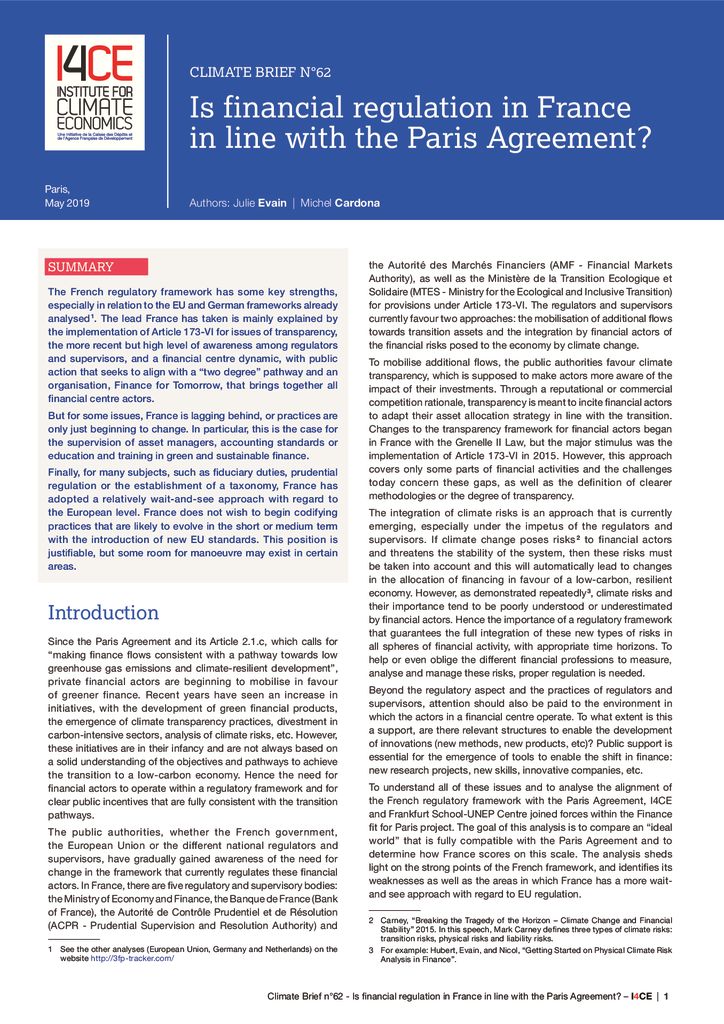Is financial regulation in France in line with the Paris Agreement?
The financial system has an important role to play in financing the transition of the economy and the drastic reduction of greenhouse gas emissions, and must take into account in its activities the risks that climate change poses to it. The French government has begun to mobilize on the subject, as have the Paris financial centre and the various institutions that supervise the financial system . What is the outcome of these actions: is financial regulation in France equal to the Paris Agreement?
In order to answer this question, the Institute for Climate Economics (I4CE) and the Frankfurt School – UNEP Centre reviewed the entire French regulatory framework applicable to the financial system in order to identify its strengths, weaknesses and therefore its necessary changes. This qualitative analysis is summarized by a rating, assigned in the most transparent way possible.
This study shows that the French regulatory framework has solid advantages, particularly compared to the European, German and Dutch frameworks analysed elsewhere. This advance is due in particular to the mandatory climate disclosures for investors, obligations that date back to the Energy Transition Law for Green Growth of 2015 and have made France a pioneering country in this field . The more recent awareness of financial supervisors in France and a strong financial market dynamic are also assets.
But on other issues the delay is significant or practices are only beginning to change. This is particularly the case for the supervision of asset managers who do not integrate climate issues or informing consumers about the climate impact of their financial investments. France is also lagging behind in taking climate change into account in national accounting standards or education and training in green and sustainable finance.
Finally, on many subjects, France has a rather wait-and-see attitude towards Europe: it prefers to wait for the introduction of new European standards. This is particularly the case for the modification of prudential regulation in order, for example, to better take into account the risks related to climate change in the calculation of the capital required from banks. This wait-and-see attitude is also reflected in the consideration of climate in investors’ fiduciary duty, or in the establishment of a taxonomy of “green” economic activities.
This evaluation exercise reveals that, although France is one of the leaders in green finance, there is still a long way to go to achieve a regulatory framework that is fully in line with the objectives of the Paris Agreement. The progress made in some areas should not obscure the collective work that remains to be pursued.
Plus d’informations:
3fP, finance fit for Paris:
The results of this analysis are part of a European project 3fP “Finance fit for Paris” developed jointly by the Frankfurt School – UNEP Collaborating Centre for Climate & Sustainable Energy Finance (FS-UNEP Centre) and WWF Germany, supported by the European Climate Foundation. This project aims to analyse the compatibility between the regulatory frameworks of financial actors and the Paris Agreement. The analysis focuses on three dimensions: transparency and reporting; supervision and financial stability; and the enabling environment for the development of green finance.
For France, the evaluation is co-executed by I4CE and the FS-UNEP Centre. The 3fP-Tracker site currently includes assessments for the regulatory frameworks of the EU, France, the Netherlands and Germany. Spain and Italy will be the next countries to be analysed.
These assessments will be updated annually to take into account changes in the various regulations and practices of the financial markets.
In France, there are five financial regulatory and supervisory bodies: the Ministry of the Economy and Finance, the Banque de France, the Authority for Prudential Control and Resolution, the Financial Markets Authority and the Ministry of Ecological and Inclusive Transition for the provisions relating to Article 173-VI.
https://www.i4ce.org/download/article-173-vi-bilan-du-reporting-climat-apres-deux-ans-dapplication/
Download the document:



